Related Research Articles
Andrew Nicholas Oliver and Philip Edward Oliver, together known as the Oliver Twins, are British twin brothers and video game designers.

Cinemaware was a video game developer and publisher. It had released several titles in the 1980s based on various film themes. The company was resurrected in 2000, before being acquired by eGames in 2005.
Artworx was a Naples, Florida software company that produced and supported a line of computer games from 1981 to 2015. It is named after the founder's given name. At first the company published a variety of games, including titles in adventure and arcade-action genres, but were later best known for a strip poker series.
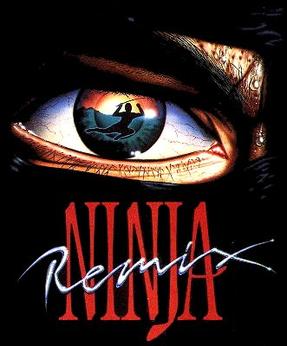
Last Ninja is a series of video games published by System 3. The first game in the series titled The Last Ninja, was released in 1987 for the Commodore 64 and was one of the most successful games for the system. In 1988, System 3 released Last Ninja 2, and in 1991 the third game in the series, Last Ninja 3. In 1990, Last Ninja Remix was released for 8-bit systems. This was Last Ninja 2 with new music, a new introductory sequence, slightly changed graphics and fixed bugs. Confusingly, the 16-bit versions of the original The Last Ninja game were also released in 1990 as Ninja Remix.

The Faery Tale Adventure is a 1987 action role-playing video game designed by David Joiner and published by MicroIllusions for the Amiga, and later ported to the Commodore 64, MS-DOS, and Sega Genesis. The MS-DOS version is titled The Faery Tale Adventure: Book I. Microillusions also released a "Book 1" version for the Amiga which was going to be the start of a series of games, according to Talin, but bankruptcy prevented it. The initial version was produced for the Amiga 1000 and featured the largest game world to that date. A sequel, Faery Tale Adventure II: Halls of the Dead, was released in 1997.

Tynesoft Computer Software was a software developer and publisher in the 1980s and early 1990s.
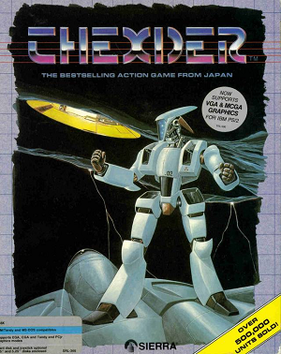
Thexder is a run and gun video game from Game Arts, originally released for the NEC PC-8801 in 1985. It was ported to many systems, including the Famicom, MSX, Apple II and DOS. It was a commercial success, selling over one million units worldwide.

Fire Power is a military tank action game developed by Silent Software for the Amiga. It was released in 1987 and published by MicroIllusions and Activision. Ports were released for the Apple IIGS, the Commodore 64 and for MS-DOS in 1988. An Atari Lynx version was planned but development never started due to internal conflict with Epyx.
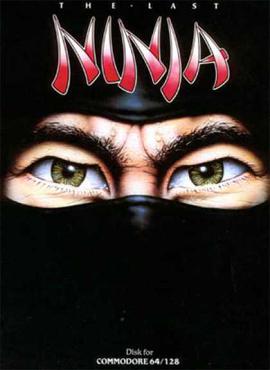
The Last Ninja is an action-adventure game developed and published by System 3 in 1987 for the Commodore 64. It was converted to the Apple IIGS, MS-DOS, BBC Micro and Acorn Electron in 1988, the Apple II in 1989, the Amiga and Atari ST in 1990, and the Acorn Archimedes in 1991.

Eutechnyx Limited is a British video game developer based in Newcastle upon Tyne, England. Since 1997, the company has focused on racing games. They are known for their largely panned video game Ride to Hell: Retribution, work with the NASCAR The Game franchise, and as a developer on various other racing titles and games.
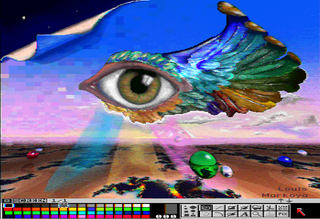
Photon Paint is a Hold-And-Modify (HAM) based bitmap graphics editor for the Amiga, first released in 1987. Photon Paint was the first bitmap graphics editor to incorporate 3D solid modeling and texture mapping as an integral part of the program.

4th & Inches is an American football sports game by Accolade. It was released for the Commodore 64 in 1987 and ported to Apple IIGS, MS-DOS, Amiga, and Mac OS by Sculptured Software in 1988. It was designed by Accolade co-founder, Bob Whitehead. An expansion pack, Team Construction Disk, was released in 1988.
Manley & Associates was an independent software developer, founded in 1982, which developed or ported over 70 video games, multimedia, and educational entertainment titles which were published by other companies, including Electronic Arts, Activision, Disney, GameTek, Publishing International, and Spectrum HoloByte. Many of the company's early games were one or two person projects created in founder Ivan Manley's house, but eventually it grew to roughly 60 people working from an office park in Issaquah, Washington.

Dream Zone is an adventure game developed by JAM Software and published by Baudville. It was released in 1988 for the Apple II and Apple IIGS, followed by versions for MS-DOS, the Amiga, and the Atari ST.

Solitaire Royale is a collection of solitaire games published by Spectrum HoloByte in 1987 for the Apple IIGS, MS-DOS, Macintosh, and Amiga. The eight games included are "3 Shuffles and a Draw", "Pyramid", "Golf", "Corners", "Reno", "Klondike", "Canfield", and "Calculation". There are also three children's games: "Pairs", "The Wish", and "Concentration".
Addictive Games was a UK video game publisher in the 1980s and early 1990s. It is best known for the Football Manager series of games created by company founder Kevin Toms. The company was originally based in Milton Keynes, England, and later relocated to Bournemouth, in southern England.
David "Talin" Joiner is an American game programmer, who created games such as The Faery Tale Adventure and Inherit the Earth, contributed audio to Defender of the Crown II (1993), engineering for SimCity 4: Rush Hour (2003), and The Sims 2: University (2005).

Faery Tale Adventure II: Halls of the Dead is a video game developed by American studio The Dreamers Guild and published by Encore Software in 1997 for MS-DOS and Microsoft Windows. It is the sequel to the 1987 game The Faery Tale Adventure. It was the last game developed by The Dreamers Guild before the studio's closure.
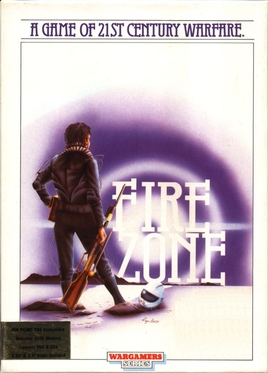
Firezone is a 1988 computer wargame developed by Arcadia and published by Personal Software Services (PSS) for the Amstrad CPC. It is part of PSS' Wargamers series. Ports for Commodore 64, Amiga, Atari ST, and MS-DOS were released later.
References
- ↑ "Home of the Underdogs - Company profile: MicroIllusions". 2006-10-04. Archived from the original on 2006-10-04. Retrieved 2023-06-29.
- 1 2 3 "The Faery Tale Life of MicroIllusions". The Digital Antiquarian. 2015.
- ↑ "Romantic Encounters at the Dome (1987)". MobyGames. Retrieved 2023-06-29.
- 1 2 "Gamespot Company Page For Microillusions - Games By Microillusions - Microillusions Company Information". 2007-09-29. Archived from the original on 2007-09-29. Retrieved 2023-06-29.
- ↑ "The Faery Tale Adventure: Book I (1987)". MobyGames. Retrieved 2023-06-29.
- ↑ "Fire Power (1987)". MobyGames. Retrieved 2023-06-29.
- ↑ "Dondra: A New Beginning (1987)". MobyGames. Retrieved 2023-06-29.
- ↑ "Halls of the Dead: Faery Tale Adventure II (1997)". MobyGames. Retrieved 2023-06-29.